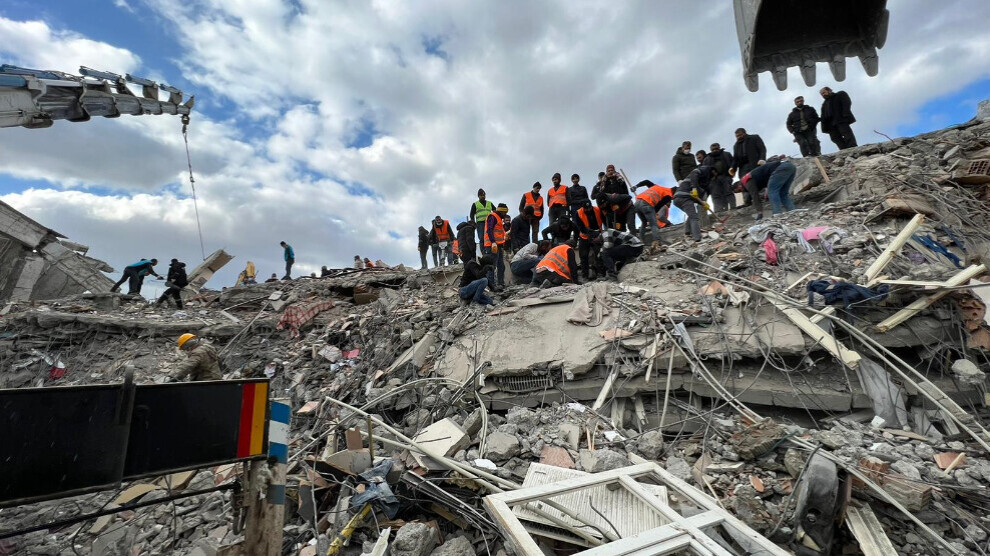HDP MP Dede: Earthquake left 80 percent of Adiyaman devastated
Peoples’ Democratic Party (HDP) MP Sait Dede said that Adiyaman province was massively hit by the earthquake which has left 80 percent of the city in ruins.
Peoples’ Democratic Party (HDP) MP Sait Dede said that Adiyaman province was massively hit by the earthquake which has left 80 percent of the city in ruins.

The 7.8 and 7.7 magnitude earthquakes that struck 10 provinces in Turkey and North Kurdistan killed more than 38 thousand people in Turkey alone. Although 12 days have passed since the earthquake, tens of thousands of people are reported to be still under the rubble. Non-governmental organizations, especially the HDP, are continuing to help the victims in the earthquake-hit areas that the state has left to their fate. In 10 provinces where the Turkish state disregards human life, search and rescue efforts have been brought to an end and the removal of the debris has begun.
In the meantime, the AKP-MHP government is trying to take advantage of the disaster. The fascist Turkish government is blocking aid from the HDP and non-governmental organizations and seeks to make profit on the reconstruction of buildings in the earthquake-hit areas.
HDP deputy Sait Dede, who has been in the area since the first day of the earthquake, spoke to ANF about his observations.
ADIYAMAN DEVASTATED MASSIVELY
Dede remarked that the HDP responded to the earthquake in an organized manner from the first hours of the earthquake. He said: “We immediately turned the election coordination units established in all our provincial-district organizations into crisis coordination. I mostly stayed in Adiyaman. When we reached the city, we saw that it was terribly devastated. We realized that there was absolutely no organization and coordination. It was not clear who was doing what. 80 percent of the city was in ruins. In the first days, there was no electricity. After three or four days, only some districts were given electricity. Thousands of people were under the rubble and others who were rescued were waiting outside in the cold weather. Rescue efforts started on some wrecks on the second day, and on some other wrecks on the third-fourth day. But the efforts were very insufficient.”
GOVERNMENT WAS NOT PRESENT IN EARTHQUAKE AREAS
Dede said that people everywhere were complaining about the state’s non-existence. He continued: “There was literally no one around. But volunteers began to come to Adiyaman from all cities. Aid trucks began to arrive from all parts of the country. In fact, the government was almost non-existent during the first three days. In the meantime, the non-existent government was trying to block volunteers and aid deliveries. Despite all this, solidarity was at its peak. People did everything they could. But unfortunately, people’s capacity was very limited because construction equipment and professional rescue teams were required. The death toll would have been much less if intervention had been made in an organized manner on time. When we went to the rural areas, we saw that some villages had not been reached by rescue teams for three or four days. People tried to pull their relatives from the rubble by their own means and by volunteers. The survivors were waiting outside in the freezing cold. The government was not present there. There were no tents, no shelter, no heating. There were only aid materials brought by the volunteers. There were the peoples of Turkey and NGOs. There were people coming from Hakkari, Şırnak, Mardin, İzmir, İstanbul, Mersin, Adana and Samsun. State officials appeared much later.”
SOLUTION LIES IN DEMOCRATIC LOCAL GOVERNMENTS
“Thousands of people in the earthquake area told us that they had heard the voices of their relatives trapped under the rubble during the first days, but later, their voices were not heard anymore because there was not early and correct intervention. There are still thousands of people under the rubble. Now, there is a serious need for winter tents, containers, hygiene materials and dry food. Unfortunately, our observation in the field shows that the death toll is much higher than officially acknowledged. Because there was no record, the people buried their relatives immediately. A system based on profit, corruption, war and exploitation collapsed and thousands of our people died under the rubble. The strict centralism of the nation-state blocked even tents and rescue efforts. We have seen once again with great pain that the solution lies in democratic local governments.”